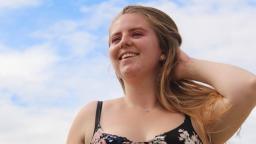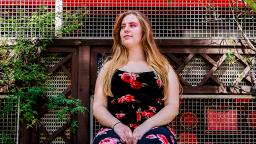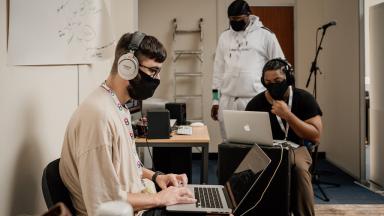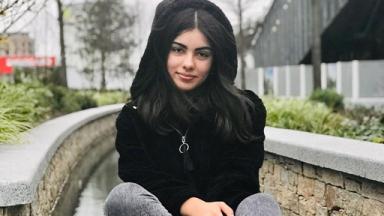
Written by Amy Mellows, Youth Music NextGen. This interview took place in October 2020, and was published on 11 January 2021.
Set up in 1997 by a group of patients at Highgate Mental Health Centre, Key Changes provides music industry-focused mental health recovery services in hospitals and the community for musicians, song writers, lyricists, producers, vocalists and MC’s. Their approach promotes wellbeing and recovery through studio sessions, artist development and live performance. Supported by music industry mentors, participants develop skills that open pathways to opportunities in education, work experience and employment.
Hainault based Singer-songwriter and Community Arts Practitioner Rosie Webb (21), speaks to me about the opportunities that Key Changes provided for her during the pandemic, the impact of music on mental health and her socially distanced performances at hospitals and music venues.
How has the pandemic impacted you and your area?
I live at home with my parents still so the pandemic took quite a toll on my family life, both my parents are key workers, and I was writing my dissertation from my room. I didn’t have that opportunity to physically go into Key Changes and get that release and I don’t have a [studio] set up at home. It really kind of affected me in a very negative way at first, I lost a lot of inspiration and drive to do things. I think, like a lot of people, I lost my sense of where I was going, because everything kind of just stopped. It was just a bit of a nightmare.
What work were you able to do with Key changes during lockdown?
Thankfully they contacted me, and like a light in the dark, asked me if I wanted to do some studio sessions over Zoom. I spoke with one of the producers I was going to work with, David, he’s an electronic music producer. We spoke about what we were feeling and what kind of feel we wanted for the music. I’m a songwriter as well, but I struggle to put music behind the writing on my own, because I don’t play any instruments, I’m just a vocalist. It was great to have someone else there who had a shared idea of how things could sound and could play around with beats. If it sparked something in me that I could write to, I would write it down.
For a while it was just sitting over Zoom together, he was making something live on his laptop and I was trying to write at the same time. Surprisingly it worked a lot better than I thought it was going to, because of the fact that he was really open and understood my frustration in not having any professional equipment. I didn’t have a microphone or even proper headphones, so it was good to have that support.
How long did that last? Did you do anything else with Key Changes during lockdown?
We made two really nice tracks within the space of five Zooms. One was Alien inspired talking about wanting to get out of this planet, out of this pandemic, needing something to take me away. It kind of just went like that as a back and forth, after our Zoom I’d record something and send it to him.
I also work with another artist and guitarist at Key Changes who was referred through NHS services, and we started writing music together. We had our first paid gig on 15 October and now we have another one coming up at the Underbelly in Hoxton. That’s also something great that came out of Key Changes during the pandemic. When it got to late July and August, we were able to start meeting up and rehearsing and put ourselves out there a bit more. Being able to work with another artist, make music and really click with them, that’s something the project has helped nurture.
What kind of music do you usually make?
I’m really into RnB and Soul, I’m into Pop and Funk as well. I have some music on Soundcloud that I released with Key Changes and I have my mini-EP project coming out on 4 November. That’s got all of the tracks on that I’ve made over the past two years.
Tell me more about the EP!
I joined Key Changes through a music producers programme, I’d never been in a studio, let alone sat with a producer. I sat with a man called Yohan, one of Key Changes’ in-house producers and he was incredible. The EP is self-titled and it’s a project that shows my growth throughout the last two years. I feel like the songs get stronger throughout. That’s kind of something I can put out and show people, that this is my starting experience, and this is only the beginning really. So I’m quite excited for that to come out.
Tell me more about how you first got involved with Key Changes then, did you sing and write music before?
I’ve always been singing and song writing since I was very young. I went to the Brit school and trained in Community Arts practice. I’ve always been a performer and loved being on stage and doing open mics and karaoke nights, but I’d never been into a music studio before and worked with someone else collaboratively on my music. I wanted to be a singer, but it was always just my hobby, I didn’t know how to put myself out there.
I’ve worked at St Luke’s Community Centre since I was 16 and I came across Key Changes’ music production course there. The Key Changes producers are good at being really flexible with whoever they work with. They are there for your music making. They could see I was keen to sing and it was only four or five weeks until we had a full piece with harmonies and everything. They then offered me the chance to be put on a programme, which I felt really lucky for, because I have experience of negative mental health but I’m not referred from a service.
Key Changes saw how keen I was to make music with them and how much it was benefiting me already, and they offered me an artist music programme. I’ve been there ever since. I also volunteer for them as much as I can and give 110% support to all of the other artists there. I just love how it’s become my little family now and my place of escape, it’s where I started and it’s my home ground. They’ve done so much for me in terms of letting me express myself musically and creatively without boundaries or judgement.
Has it helped you personally and socially during the pandemic?
Yeah, to be able to have the hour of just making music and knowing that I had something to look forward to within the week. I was still writing my thesis and my final show for Guildhall, not only mentally but physically my body was drained. Having something to then work on that I could look forward to bringing to the next session, that’s something that I really took a lot from. Now we have two great songs together and I’ve met and worked with a new producer that I wouldn’t have worked with otherwise. It’s given me a lot of courage to keep going on this music journey as well.
They also sorted out a way that we could all get together for our open mics over Zoom. On a Thursday afternoon we have an interview or talk with an industry guest. After this we have an open mic session where we can show any new songs we’ve been working on. It’s a really nice wholesome hour to get together and keep everyone on track as well. For people with mental health to have something to look forward to can be so important. The fact that they’ve still been able to nurture that for those that aren’t able to come into the studio anymore is really useful.

Has working with these new producers and doing these virtual open mics helped you musically and professionally during the Pandemic?
I feel like it’s definitely given me more confidence to do the gigs I’ve done this year because I haven’t been out of action. For me and for my mental health it’s really important to have that routine. A lot of my singing and writing skills have progressed because I’ve been able to practice. I’ve learnt to set up microphones and how to use Logic with David because I had to - those kind of technical skills. They’ve given me the tools to be a collaborative artist. Key changes have taught me that if you want something you can get it, you can collaborate and you can make things happen.
Do you have a highlight or proudest moment with Key Changes during the pandemic?
During lockdown Key Changes also invited me to do some socially distanced performances for patients at different hospitals with another artist. We performed at Bethlem hospital, in a socially distanced way, for the patients who were walking around the grounds - some of the patients came up to the microphones and shared their pieces too. That was definitely a highlight.
Yesterday I was invited to perform on a ward at Lambeth Psychiatric hospital and that was wonderful, I performed to patients and staff for Black History Month and for the patients on the ward. Just seeing the joy that people get from singing and music is irreplaceable for me. It really brings out something else in someone. When someone has a microphone in their hand it really does just make you feel like you can do anything. Some of these patients have been through the worst things you can imagine. Seeing people smile when music is played, when people are dancing and singing together, it was such a highlight for me. I’ve been invited to do more of these gigs already and it’s just an honour. Being able to perform and just make people happy.
What do you like most about Key Changes?
What I love about Key Changes is that it’s not music therapy but is a therapeutic way of helping people deal with their problems. Working with Key Changes inspired my whole dissertation, because I’m really interested in how music helps people who have suffered childhood trauma or adverse childhood experiences. It’s wonderful to see how much music can change someone’s life.
Key Changes does work that is so important and needed. Some people can’t articulate their feelings or problems in speech or talking therapy or CBT. There are a lot of older artists in Key Changes as well as younger ones, and they can all be brought together through one thing, music. I think Key Changes is doing God’s work and I’m not even religious [laughs].
Thinking about them gets me emotional because without Key Changes I honestly don’t know where I would be. I’d never stepped in a music studio before and I don’t think I would have, especially at eighteen. They really changed the course of my life. I want to be a music therapist when I’m older and I want to do an MA in music therapy, because I strongly believe in how much music can be therapy.
Tell me more about your hopes and plans for the future!
I want to keep performing and gigging. Thankfully I’ve just been offered a job working with a company called Stretto music, they take musicians to schools and communities across London and the South of England. It’s something I’m really passionate about, teaching children another creative way of expressing their feelings. To keep doing music facilitation and community work, that’s where my passion lies, with people.
Check out Rosie’s music at soundcloud.com/rawxmusic and find out more about her upcoming gigs by following @rosiewebbmusic
You may also like...
Making an album in lockdown: Circle of Light
Nottingham based project Circle of Light took 2020 by storm with a new album, recorded and produced during lockdown. Hear from six of their participants about their time on the project.
Making music during the pandemic with Kids on the Green
15 year old Aiysha shares the creative work she's been doing with Kids On The Green (KOTG), an arts therapy fusion project based in West London, during the pandemic.


